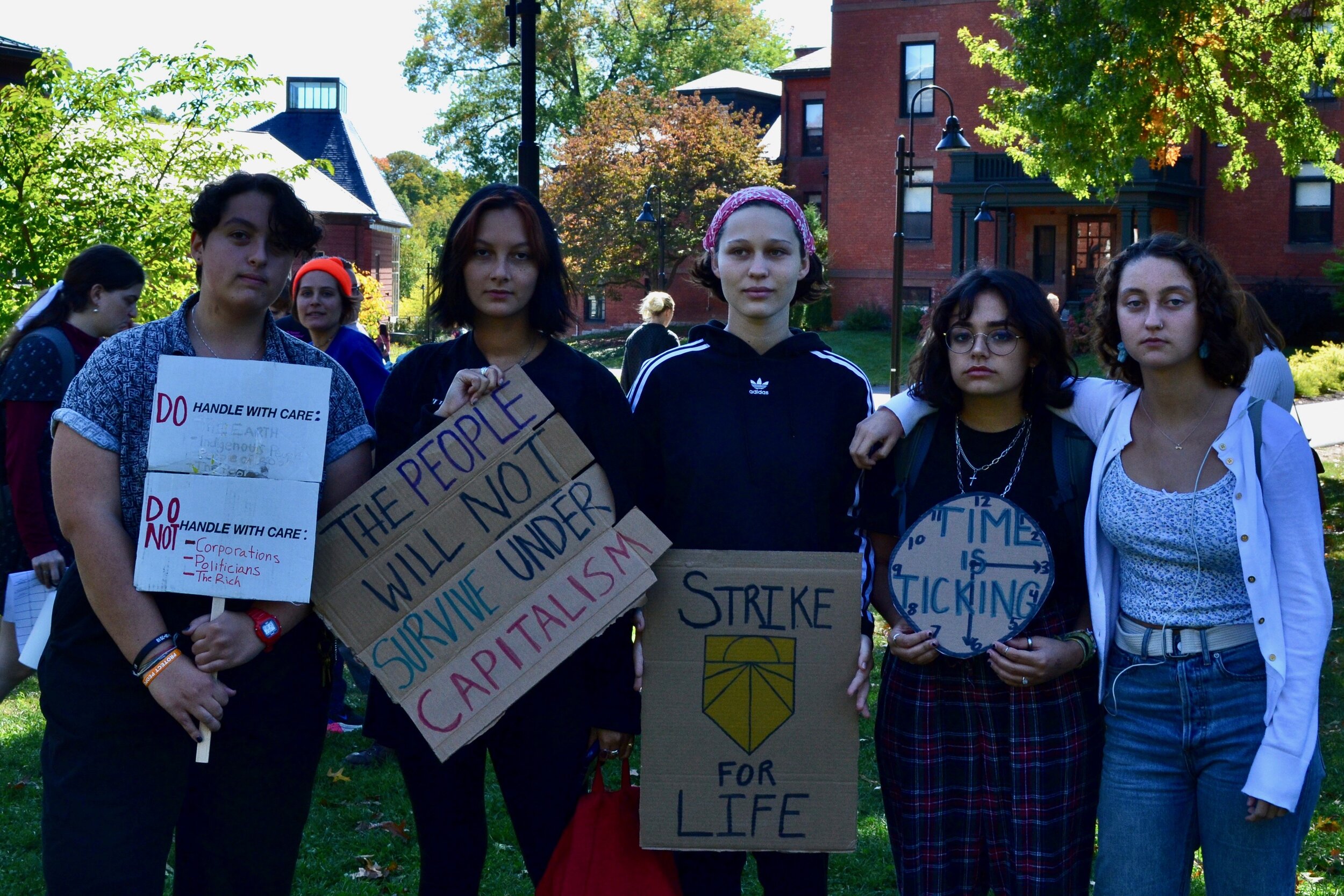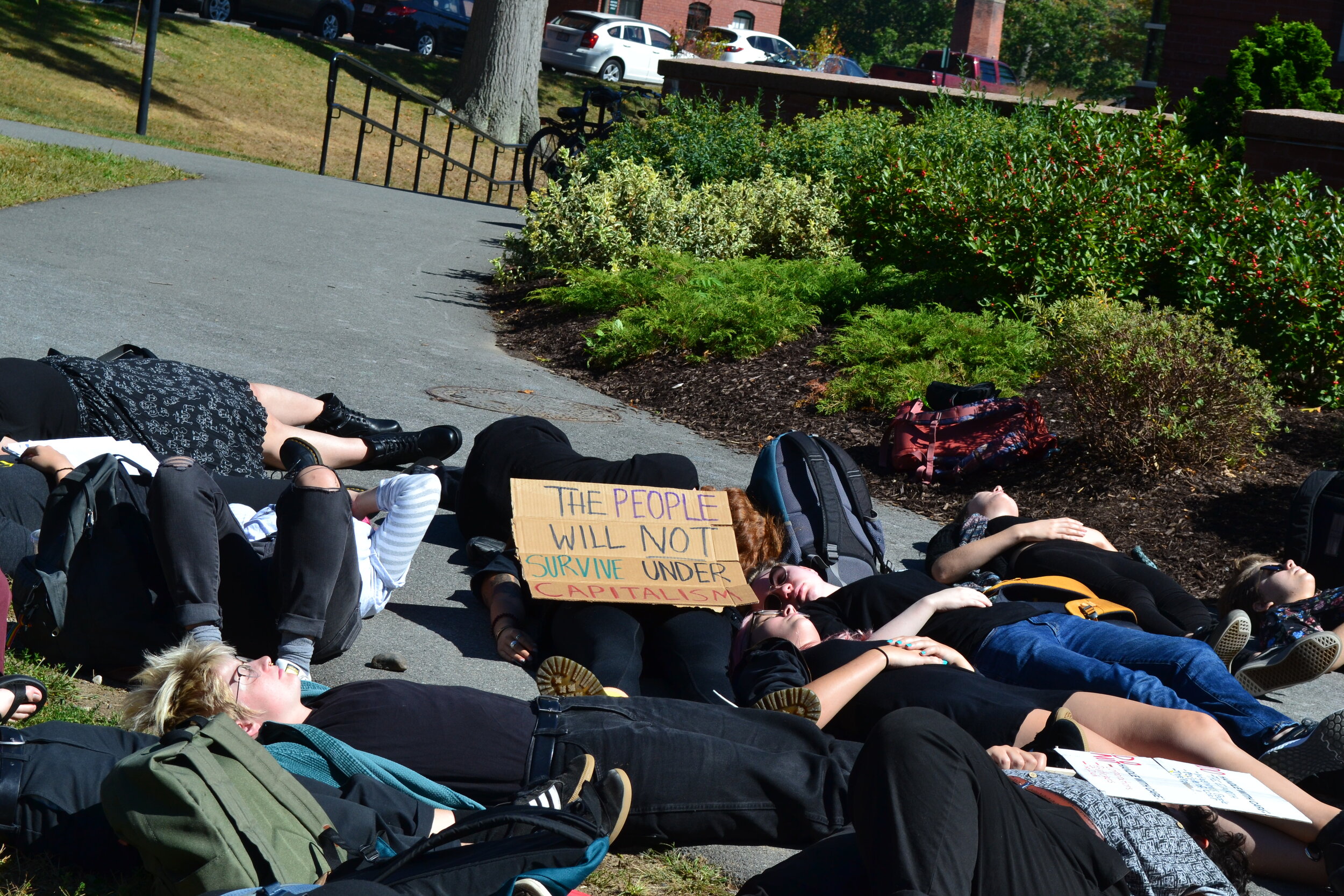

BY LIZ LEWIS ’22
Students protested outside the front steps of Blanchard Campus Center on Friday in support of climate justice, both in the Mount Holyoke community and worldwide. The event, organized by the newly formed Mount Holyoke chapter of the Sunrise Movement was advertised on Facebook as “a funeral for our futures,” and began at noon on Friday, Sept. 27.
According to their website, the Sunrise Movement is a youth-led political action organization that formed in 2017 to build “an army of young people to make climate change an urgent priority across America, end the corrupting influence of fossil fuel executives on our politics and elect leaders who stand up for the health and wellbeing of all people.”
The organization, which prioritizes just and equitable results over partisanship, seeks to achieve change through grassroots methods, encouraging individuals to open their own chapters, or “Hubs,” in “classrooms, living rooms and worship halls across the country.”
The Mount Holyoke Sunrise Movement Hub first gathered this semester, and this protest was their first act on campus.
Outside Blanchard, music began playing over speakers just before noon and students filtered in from across campus as Bastille’s “Pompeii” boomed, “How am I gonna be an optimist about this?”
The students, most clad in black in accordance with the “funeral” theme, settled around a circular chalk drawing on the sidewalk at the bottom of Blanchard’s steps. The chalk art incorporated colorful natural scenery in the center of the circle — a blue ocean wave, a blooming flower on a leafy stem and a flame — surrounded by the words “Green New Deal” in large block letters.
Some protesters brought homemade signs to the event. One, shaped like a clock, bore the words “TIME IS TICKING.” Another read, “MHC DIVEST NOW.”
A table dedicated to signing banners and a petition were set up on the edge of the Green. The petition, written by the Extinction Rebellion Western Massachusetts, called for “Five Demands for the Five Colleges.”
The first demand was for colleges to declare an official state of climate emergency.
The second demand was for the colleges to “act now” by developing “comprehensive plans with community input for complete divestment and carbon neutrality by 2025.”
“Community leadership” was the third demand, meaning “a five-college body composed of students, staff, faculty and community stakeholders [to] develop and oversee plans for responding to the climate emergency.”
The fourth demand, that the colleges “pursue a just transition,” insisted that the response to the climate emergency must prioritize those “most vulnerable to immediate and long-term impacts of the climate crisis, including youth, people of color, indigenous peoples and poor communities.” The fifth and final demand was that the colleges “prepare students for the future” via comprehensive education on environmental science and “how the climate emergency will affect their careers, their lives and the lives of other people on our planet.”
“We should not live every day worried about our futures, or if we’ll even have one.”
- Emma Sullivan ’22”
Before the event’s beginning, the organizers, most of whom wore black and yellow Sunrise Movement t-shirts, mingled with the protesters to talk about why they were on campus.
“I think it’s really important for us to raise awareness on campus,” Sarah Hyde ’22 said.
“We wanna save the planet,” Charlotte Lindblom ’22 said.
Emma Sullivan ’22, approaching the issue from a local standpoint, said, “Our college needs to put forth a more complex plan to attack the climate crisis. We can all make change here.”
Grace Tatian ’23, another organizer, also emphasized local issues as well when talking to protesters.
“We want the five colleges to declare a climate emergency,” she said.
Sullivan was the first to step up in front of the crowd, beginning the event with a short but impassioned speech.
“Every day, I am scared sh*tless,” Sullivan began. “I listen to the stories of people suffering and I feel shocked. I feel hopeless. I feel frozen.”
The crowd listened somberly, the silence punctuated only by occasional snaps of affirmation.
“This is not fair,” she continued. “I am terrified. I am sad. I am disappointed ... I am afraid for my future.”
A few minutes in, Sullivan’s speech took a turn from bitter and angry to hopeful.
“We as a generation can change this,” she said. “I saw change when I went to the Boston Climate Strike … I saw our power as a generation. This is the time to make change, you guys.” These words were met with cheers.
Sullivan concluded, “We should not live every day worried about our futures, or if we’ll even have one … Nothing can stand in the way of all of our voices combined.”
“This isn’t about policy, [or] liberal[s or] conservative[s]. It’s about money, and it’s about greed.”
- Ayu Suryawan ’22”
The event organizers opened up the microphone to any crowd members who felt compelled to speak. After a moment, Ayu Suryawan ’22 stood up to give an impromptu speech.
“We have so much power that the government doesn’t want us to understand,” Suryawan said. “When we stand united like this, we are causing a disruption … we are causing people to look at us.”
On the subject of large corporations and other leading polluters, Suryawan said, “In the end, they don’t give a sh*t about us. They only give a sh*t about money … This isn’t about policy, [or] liberal[s or] conservative[s]. It’s about money, and it’s about greed.”
Emma Foreman ’22, an organizer of the event, touched on the issue of representation in the struggle for climate justice, mentioning the lack of attention both indigenous peoples and young activists of color have received in the place of white activists such as Greta Thunberg.
“We should be centering their voices,” Foreman said.
The event then transitioned into its main portion: a die-in accompanied by a eulogy. Foreman delivered this eulogy, instructing the crowd to simply drop down to the floor “as you feel moved.”
“This is the sixth mass extinction,” she began. Foreman’s eulogy, which included a poem, was barely a sentence in before protesters began the die-in one by one, each student dropping to the ground upon hearing a line that resonated with them.
At the poem’s conclusion, Foreman called for a few minutes of silence. The bodies, still surrounding the central circle of chalk art, lay still. As it was just past noon, the sunlight beat directly down upon the pavement and the bodies lying on it. As people walked by the demonstration, some decided, impromptu, to join in and lay down next to their peers.
The die-in lasted about five minutes. When those minutes had elapsed, students somberly “awoke,” rising from the pavement in silence.
Sullivan concluded the event by urging the participants to get involved with the Sunrise Movement or other organizations like it.
“The Sunrise Movement at Mount Holyoke College is just getting started,” she said. “Whatever your strength is: art, design [or] science … you can help.”
The Sunrise Movement at Mount Holyoke meets weekly on Thursdays at 8 p.m., location to be determined.
When asked about her experience organizing this event, Hub Coordinator Karla Esquivel ’22 described it as “a big learning experience.”
“It was incredibly empowering,” she said, “because I had never gotten to that point before where I could [gather] such a large group of people and do a movement like this.”
Esquivel sees the anger and passion displayed at Friday’s event as a hopeful sign that the work of climate justice, and of the Sunrise Movement at Mount Holyoke, will continue.
“People will just get angrier and angrier as this goes on,” she said.
To Esquivel, the die-in was particularly powerful.
“Actually laying on the ground and waiting there in silence, hearing the sounds of nature — you hear the birds chirping, the wind blowing, the leaves rustling — that was an important moment for me … [because] that’s what’s gonna be gone if we don’t do something.”
